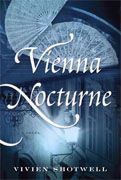Vienna Nocturne
Vivien Shotwell
book reviews:
· general fiction
· chick lit/romance
· sci-fi/fantasy
· graphic novels
· nonfiction
· audio books
· author interviews
· children's books @
curledupkids.com
· DVD reviews @
curledupdvd.com
newsletter
win books
buy online
links
home
for authors
& publishers
for reviewers

 |
Vienna Nocturne Vivien Shotwell Ballantine Hardcover 304 pages February 2014 |
|
Click here to read reviewer Leslie Nichols Raith's take on Vienna Nocturne. English operatic soprano Anna Storace (1765-1817) first performed Susanna in Mozart's Le nozze di Figaro—a role that was written for her. Born in London, Anna’s singing career as a child prodigy began by the age of twelve. This led to further study in Italy and to a successful career during the late 1770s. While in Venice in 1783, she was recruited to form part of Emperor Joseph II's new Italian opera company in Vienna. The assembled singers who joined her contributed to the finest opera buffa, the new modern comic Italian opera originally born from the commedia dell’arte.
Anna is still a child when she visits the London home of the famous castrato Venanzio Rauzzini. Better and brighter than any little girl on earth, Rauzzini tells her she’s blessed with a voice of impressive depth and complexity. He teaches her to trust in her heart with her golden pantaloons, silver wings, and blazing stockings. Anna is blindsided by a mother who is of the opinion that the opera house is “full of harlots.” Had it not been for their debts, Madame Storace would not have allowed Anna to sing there. Only Anna’s brother Stephen, who focuses on his violin with the easy pride of mastery, can give his sister the unconditional love that she so craves. Fortune intervenes at La Scala when Anna meets singer Francesco Benucci. The partnership takes them both to Venice where in 1782 she catches the eye of Antonia Salieri, who is visiting from Vienna. It seems impossible that that this should be her life or that she has made it this far: “young ladies of sixteen are not supposed to live like this—in the honeyed air, and also singing on the stage with men.” In an auspicious introduction, the young composer Mozart brightly looks into Anna’s eyes. At twenty-seven and with a ready-catching smile, Mozart carries himself proudly and easily, like a magician or a dancer. Once he hears Anna sing, he goes out of his mind with excitement and begins to write the famous opera buffa that will be tailored to his new muse’s warm, sweet, beguiling voice. It is during this time that Anna is struck by tragedy and is forced to navigate the oppression and terribly absurdity of her abusive marriage to John Fisher, the Irish violinist and virtuoso. Here in her music is her life’s refuge. Shotwell moves between Fisher’s mind-numbing abuse and Anna’s growing love for Mozart. To the composer’s credit (and to the world’s benefit), Anna, the famous singer, is finally able to unlock her creativity and find a kind of rejoicing in Mozart’s complex arias: “Do not fear me love: I will never leave you, I will always be yours.” Shotwell paints an elaborate picture of Mozart and Anna’s lives during a time of great beauty. Her portrait of Anna is richly written, and she reveals the singer’s thoughts to us through a stream-of consciousness style of prose. Many of the secondary characters act as moving set pieces, providing a lovely accent to Anna’s life—especially the agony of jealous Aloysia Lange, the ecstatic singer, who can neither act nor sing convincingly in Italian. When Anna is in danger of being sabotaged by her secret desires for handsome Benucci, who refuses even to acknowledge her passions, the young women—Josefa, Aloysia, and Sofia Weber—quickly become the source of Mozart’s intimate inspiration, providing the conflict between his great admiration for Anna and his desire to be always virtuous to his loving wife, Constanze. A rather sad tale of love, loss and heartbreak, Shotwell demonstrates the unforgiving nature of mediocrity and how the human side of genius is often sacrificed when it comes to art. Her story proves that beauty is what the world wants and what the world will ultimately demand. An opera singer herself, Shotwell’s prose sings with a rhythm all its own. She excels at depicting Mozart's musical struggles, the complex relationships between singers and musicians, and the privileged, imperial court life of eighteenth-century Vienna. Originally published on Curled Up With A Good Book at www.curledup.com. © Michael Leonard, 2014 |
|
|
|
 Click here to learn more about this month's sponsor! |
|
| fiction · sf/f · comic books · nonfiction · audio newsletter · free book contest · buy books online review index · links · · authors & publishers reviewers |
|
| site by ELBO Computing Resources, Inc. | |
 Shotwell’s approach to Anna’s life is to expose her great musical talent, combining it with soap opera qualities of her personal life and the genius of Wolfgang Amadeus Mozart, who becomes her greatest admirer and clandestine lover after the premiere of The Marriage of Figaro. Blessed with a gorgeous voice, Anna does not find success easily. She constantly struggles to achieve recognition in a musical world that is often dominated by the whims and passions of men.
Shotwell’s approach to Anna’s life is to expose her great musical talent, combining it with soap opera qualities of her personal life and the genius of Wolfgang Amadeus Mozart, who becomes her greatest admirer and clandestine lover after the premiere of The Marriage of Figaro. Blessed with a gorgeous voice, Anna does not find success easily. She constantly struggles to achieve recognition in a musical world that is often dominated by the whims and passions of men.